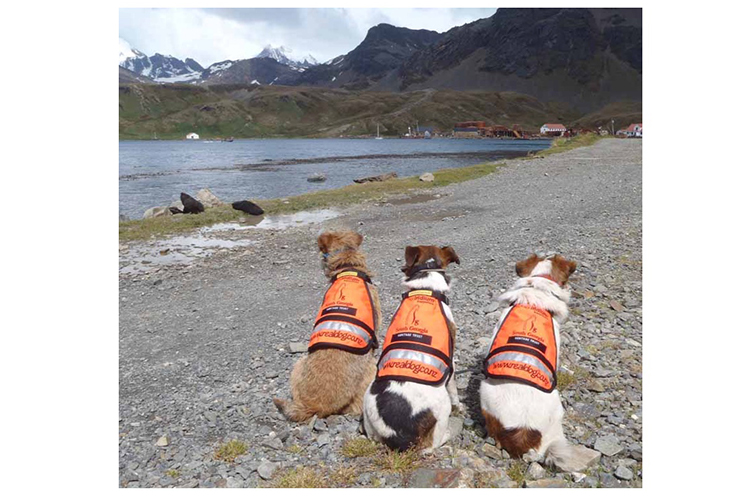South Georgia Restoration Project Final Phase
Posted by Shirley Metz
in Of Interest
Apex co-founder Shirley Metz reports here on Phase 4 (the final phase) of the South Georgia Restoration Project. Shirley and Apex co-founder Peter Harrison are on the board of Friends of South Georgia Island (FOSGI). Peter is also on the Board of Governors for South Georgia Heritage Trust (SGHT). Since the South Georgia Heritage Restoration Project’s inception, they have helped raise more than a million dollars through the donation of artwork, books, and time. On Apex Expeditions’ Antarctica, South Georgia, and Falklands voyage in January 2018, $21,550 USD was raised to support this project.
Why “Team Rat?”
In Apex Expeditions’ recent newsletter publication, we brought you up-to-date with the progress made on South Georgia’s Habitat Restoration program. South Georgia, located in the Southern Ocean, is a globally important seabird sanctuary. Over two centuries ago, invasive rodents arrived as stowaways on sealing and whaling vessels and have had a catastrophic impact on the bird populations. The rats threatened the existence of two ground-nesting species, the endemic South Georgia Pipit and South Georgia Pintail. However, the 9,000-foot high island, has millions of burrowing seabirds–Storm Petrels, Diving Petrels, Prions, and Blue Petrels—species difficult to assess because of their nesting habits. Professor Mike Richardson, a Trustee of the SGHT and Chair of the Habitat Restoration Project steering committee proclaimed that: “This has been an incredibly important project for the wildlife of South Georgia, delivered by a team tackling the often challenging and highly inhospitable climate as well as the remoteness of the location.”
Obviously, this dangerous exercise would require the world’s leading experts in eradication work. In addition, an international effort would be needed to raise funding.
South Georgia Restoration Baiting Phases Completed in 2015
Planning and fundraising began in 2007 for the three phases of fieldwork (2011, 2013, and 2015). In March 2015, with the last bait pellet dropped on the island, the third eradication season was completed. SGHT, a small Scottish charity based in Dundee, together with its USA counterpart, FOSGI, raised over USD 10.5 million (£7.5 million) to finance the work! Funds came from individuals, foundations, businesses, and the British government.
How Will We Know if the Baiting Succeeded?
Since the last extensive baiting work in 2015, no signs of rodents have been detected. However, a comprehensive survey would be essential before the island could be declared “rodent free.” This Antarctic summer, three dogs, 15 people, and three vessels operated the fourth phase of the South Georgia Restoration Project. The survey has used a combination of detection methods—deploying inert devices, such as chewsticks, chewboards, peanut butter flavored wax tags, as well as tunnel and camera traps.
Project Director Dickie Hall explained: “The scale of the task is daunting as it is many times greater than any rodent survey previously undertaken anywhere in the world. We are looking at surveying a coastline almost 620 miles (1,000 kilometers) with a land mass of 350 square miles (895 square kilometers.) It would be impossible to inspect every square meter of land, so the strategy was to subsample the terrain in such a way as to maximize the chances of detecting any surviving rodents.”
The Secret Weapon…“Team Dog!”
To determine whether the years of baiting were successful, three specially-trained sniffer dogs and their handlers have now joined “Team Rat.” At this moment they are nearing completion of the second half of Phase 4 of the project. Despite the challenges of South Georgia’s weather and topography the crew is confident of surveying all sites in the time available. For example, heavy rains can wash away tracks and dampen down the movement of smell in the air. Richard Hall, Project Director of Phase 4, has recently reported that “no evidence of rodents has been found and many of the smaller birds (pipits, terns and storm-petrels) are being seen in great numbers. At one site over 40 pipits were counted in a short transect.”
Shackleton, Scott, and Amundsen Took Dogs to the Antarctic
Both Shackleton and Scott took dogs as well as ponies aboard their ships. Historic journals describe the challenges with seasickness that both animals and men had with the rough seas. This has also been a challenge for “Team Dog” in South Georgia but it also makes them that much more eager to get ashore to do the survey work. Sarah Lurcock, manager of the South Georgia Museum and a board member of SGHT, commented: “Since arriving, the dogs have been logging thousands of kilometers, crisscrossing back and forth over the terrain to search for rodents. And the dogs are so little!”
South Georgia Restoration…the Final Verdict
Keep an eye on our website for news of the outcome of this crucial stage. We soon hope to be able to make the announcement that indeed South Georgia is “rodent free.” In the words of Professor Mike Richardson, “Millions of birds will be able to reclaim their ancestral home.”
Learn More
Full details on the South Georgia Restoration Project can be found at the FOSGI website: www.fosgi.org. FOSGI is a tax-exempt non-profit organization dedicated to raising funds for the conservation of South Georgia. They can be contacted by email at info@fosgi.org. To see the magnificent island of South Georgia, join Apex on our upcoming Antarctica, South Georgia & Falkland Islands expedition in 2019.

